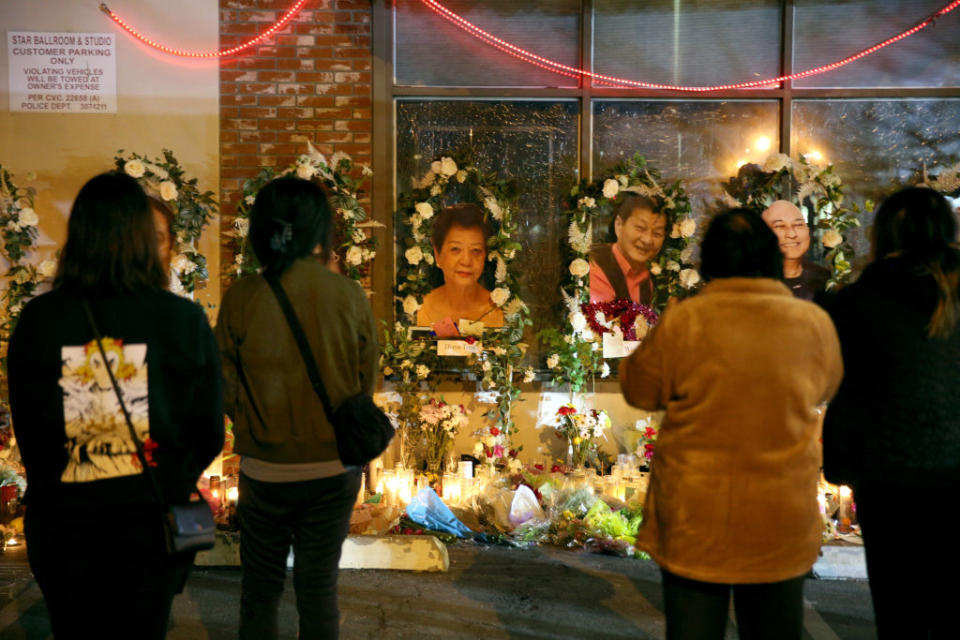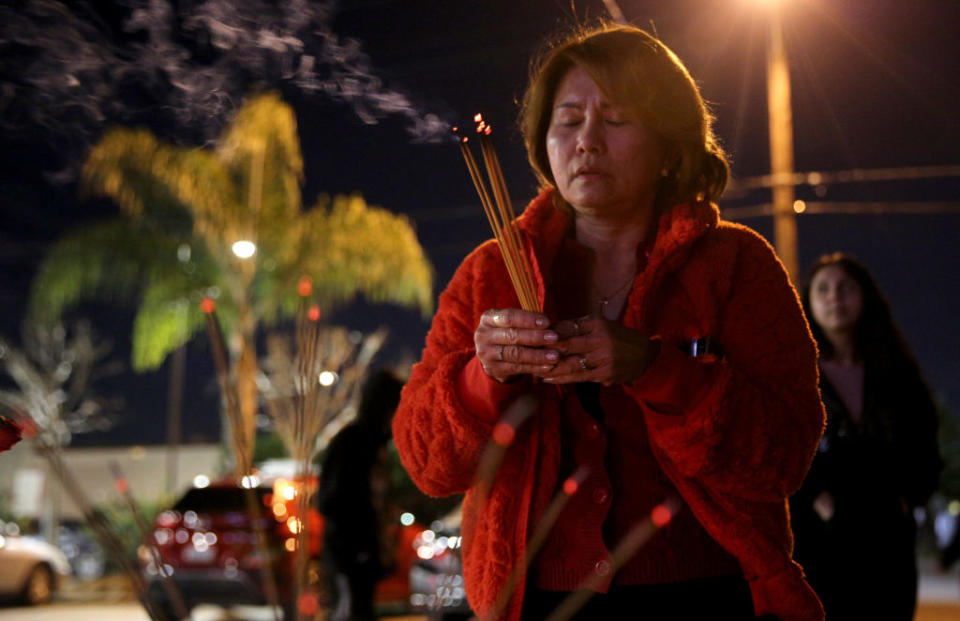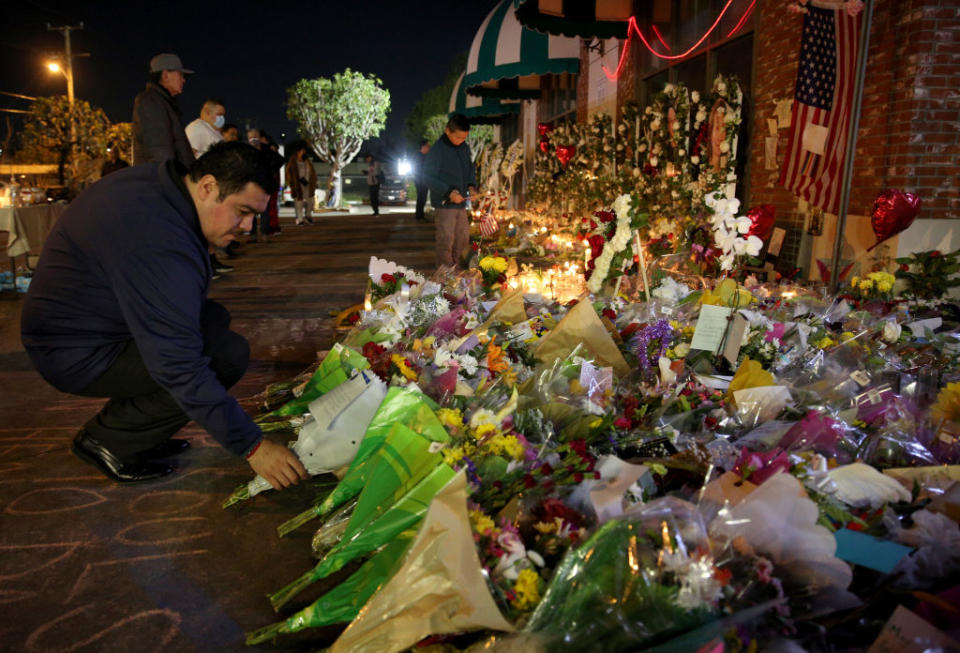How to Help Asian Americans Affected by Mass Shootings in the U.S.

My Chinese mother picked up dancing again during the 2020 Covid19 pandemic. She told me she always found joy in the activity growing up, so she signed up for online weekly Zoom classes that specialized in traditional Chinese dance. To see her eyes light up with joy as she pulled on her black leggings and dainty red ballet slippers every Wednesday evening brought me eyewitness experience of parents healing their inner child. And right now, nothing feels more important than talking about how to help Asian Americans affected by mass shootings.
To hear of the tragedy that took place at a Monterey Park ballroom dance studio, right after Lunar New Year celebrations on the evening of Saturday, January 23rd, was another level of devastation. As a Chinese-American immigrant woman who has spent most of my childhood in California and now spend most of my time living in Los Angeles, the pain to the Asian diaspora is beyond indescribable. Located in the San Gabriel Valley just miles away from Los Angeles, Monterey Park has a dense Asian-American population. The eleven victims at the Star Ballroom Dance Studio were identified as five men and six women, all aged between 57 to 76. The female victims were Xiujuan Yu (57), Hongying Jian (62), Lilan Li (63), Mymy Nhan (65), Muoi Dai Ung (67) and Diana Man Ling Tom (70). The male victims were Wen-Tau Yu (64), Valentino Marcos Alvero (68), Ming Wei Ma (72), Yu-Lun Kao (72) and Chia Ling Yau (76). However, it’s imperative to point out that these names mean more than just a lost life; they are whole individuals with families, friends, partners and loved ones as well as lifetime memories of struggles and happiness that are now absent. Just days later on Monday, January 23rd, another unrelated mass shooting killing seven at a mushroom farm occurred in Half Moon Bay, a city about thirty miles south of San Francisco.
More from StyleCaster
See Inside Gisele Bündchen and Tom Brady's $20 Million Mansion (Including Their Bedroom!)
Everything You Need to Know About the In-N-Out Heiress, America's Youngest Female Billionaire

Mainstream media is definitely unkind to marginalized groups. Fear and hurt strike me as I absorb all of this terrible news, and no headline I’ve seen is comforting or highlights the detrimental pain that hits me like currents. Seeing the original headline to a Wall Street Journal opinion story published on January 23rd, right before the Monterey Park shootings, entitled Are There ‘Too Many Asians?’ describing China’s one-child policy being influenced by the West (I am familiar; I was born during this period), took brute sensationalism to another untimely and insensitive level. We need to be cognizant of bias and do better, especially in times of tragedy. The editorial team at WSJ had the sense to change the headline on January 24th to China and the Population Bomb That Wasn’t, but the damage has already been done.
Click here to read the full article.

Naturally, my mind races, imagining how these victims could have easily been my dance-loving mother or aunties (ah yi) and uncles (shu shu). I know I’m one of the fortunate ones to be able to reflect my empathy and not experience this trauma firsthand, but how are we expected to carry on with such heartbreaking news, inundating us and our communities over and over?
I can go on and on about my thoughts on this country’s need for accountable media and proper legislation for gun control, but here are some immediate ways we can overcome this feeling of helplessness. If you have the emotional bandwidth to feel like you can begin aiding and tackling this, here are some steps to cope and get started:
How to Help Asian Americans & Victims of Mass Shootings

1. Practice self-care
As counterintuitive as it seems, it’s so important to first take a step back, check-in with yourself, and let that emotional release out. Limit your exposure to the news. Take a mental health hour or day to work through and process your feelings on the matter, and make sure you’re okay. You can take as little or much time as you need to sort through the hurt to gain clarity on what you need. Also, in a world where your mere existence isn’t deemed as societally normative, just taking care of yourself and being is a radical act of self-preservation and political warfare. You are greater than the hatred you see enacted on this globe.
2. Talk about it
Bring awareness and light to the situation, however dark it may feel. Make sure that once you check-in with yourself, reach out to your peers. Only when we create dialogue around these issues can we begin to work together to support each other’s thoughts and emotions, as well as combat the problem as a whole. Sharing it with your community and on social media also gives these victims the attention and honor they deserve.
3. Check in with your AAPI friends and peers
I can personally say as an Asian-American woman in the current climate we live in, it can feel anxiety-inducing and terrifying to even step out at times to complete simple errands like a grocery run. Reach out to your AAPI cohorts to check in; even a simple text is cherished and goes a long way. It demonstrates empathy, compassion and love in a world that can seemingly appear hateful and validates their unique experience.
4. Support AAPI-owned businesses
Ostensibly small acts can create a ripple effect of positive transformation. Utilize your purchasing power for good and invest in AAPI-owned companies. This includes going to your favorite Asian restaurants or your local Chinatown (or Koreatown, Japantown, etc.) neighborhood. Not only are you buying beautiful products or even delicious food, you’re choosing to spend and believe in small-business owners and founders who are trailblazing against all odds.
5. Denounce hate speech and abandon stereotypes
The only way to actively hold people around you accountable is to kindly call them out when you see them engaging in harmful hate speech and stereotypes. If it’s a serious situation with strangers and you’re not ready to step in, report it or call 911. Hate crimes are underreported, and organizations like Stop AAPI Hate are here to help. There’s also anti-AAPI hate petitions to sign, such as one condemning hate and violence against Asian women and hate crimes against Asian Americans.
6. Lean into your community to heal
Don’t neglect the power of your people. Group-oriented therapy methods such as art or movement therapy are intangibly powerful beyond words. While thinking of the Monterey Park ballroom shootings, movement-based therapy like a workout or dance class is appropriate and pays tribute to the tragedy. Additionally, volunteering gives back and brings connection in real time. There are plenty of organizations to proffer assistance to, such as the National Asian Pacific Women Forum, Asian Americans Advancing Justice and Compassion in SGV.
Additional Mental Health Resources Below:
National Disaster Distress Helpline
1-800-985-5990
American Counseling Association
Chinatown Service Center’s Behavioral Health Team
1-213-808-1800
Asian Mental Health Collective with U.S. Therapists who specialize in the AAPI community
They also have a list of free mental health support groups
The California Victims Compensation Board will reimburse victims and their families for any mental health services
Los Angeles County Department of Mental Health
1-800-854-7771
If You Need Immediate Help:
If you or someone you know needs immediate help, call the Suicide Prevention Lifeline at 988
Best of StyleCaster


